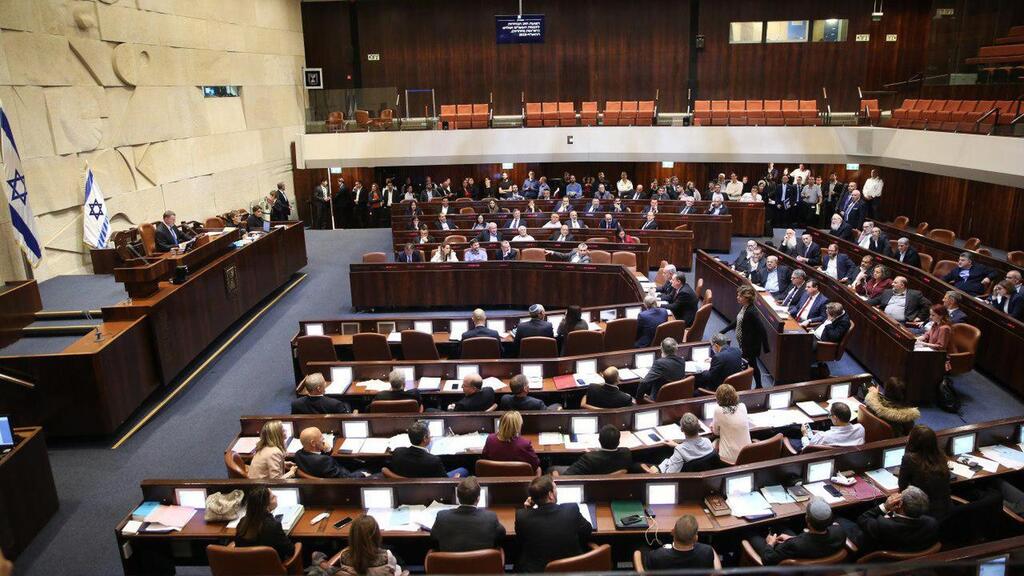Getting your Trinity Audio player ready...
In some ways, there was nothing more predictable than the bombshell former Yamina MK Idit Silman dropped Wednesday on the coalition, which she herself chairs.
With a coalition of only 61 Knesset members compared to the Opposition’s 60, Prime Minister Naftali Bennett and Foreign Minister Yair Lapid’s jointly formed government has been hanging by a thread pretty much from day one.
Bennett’s own Yamina party, as well as Bennett himself, previously pledged not to join a government that relies on Arab parties.
Nevertheless Mansour Abbas' Islamist Ra'am party eventually made it into the coalition, which the Opposition has been going to great lengths to topple, mainly by trying to get the remaining members of Bennett’s Yamina to resign from the government.
Within the coalition, Yamina MK Nir Orbach was seen as the weakest link, and as the most likely defector. Coalition whip Silman, meanwhile, was seen as an absolute opportunist who will vehemently refuse to return to Benjamin Netanyahu’s Likud-led bloc.
That assumption was a mistake.
These opportunists are exactly the ones who build and overthrow governments in Israel, and Likud MK Yariv Levin - who effectively orchestrated Silman’s sudden resignation from the very coalition - knows this well.
Silman’s reasoning for quitting was Health Minister Nitzan Horowitz’s instruction to hospitals not to inspect visitors entering their premises during Passover for chametz - food products that are forbidden on the Jewish holiday according to religious dietary laws.
There is no point in mincing words on the issue, Silman decided to defect after she was promised the position of health minister in a Netanyahu-led government, should one emerge following the next election.
Those who spoke with Silman insist that her distress over the chametz issue was genuine.
But given that she canceled several meetings with both Bennett and Horowitz meant to resolve the matter - one can’t help but wonder what other issues Silman would have used as an excuse to try and overthrow the coalition.
Maybe budgetary issues for new settlements in the West Bank? Lack of police enforcement in the Negev? Poor roads in the Western Galilee? Failure in observing a fallow year?
Again, there is no need to mince words. Her party chairman broke his promise and is currently the prime minister in a government of which he promised not to be a part. Silman broke her promise in order to become health minister (If Netanyahu keeps his promise, of course).
The coalition is doing all it can to try and bring Silman back and prevent it from imploding. Horowitz himself has sent reassuring messages in abundance - even before Silman’s resignation, and also afterwards.
Prime Minister Bennett will now have time for some much needed introspection. His political mistakes are clear: he indulged in his job as a "professional" prime minister, but there is no such thing in Israel.
It does not matter if your name is Ariel Sharon or Benjamin Netanyahu. Every Israeli premier must invest a substantial amount of time and energy to consolidate power and preserve the coalition.
Bennett should have spent a little less time talking with Ukrainian President Volodomyr Zelensky, and a little more time sucking up to Silman and other opportunist MKs like her.
He should have had less late night discussions about the Kremlin and more about how to pamper the members of his party who are under a constant siege by right-wing activists, who claim the lawmakers have abandoned their conservative beliefs.
True, Bennett very effectively led a government responsible for many important reforms and changes than Netanyahu’s last two governments. And yet, it did little to help the coalition's actual political survival.
Bennett had one job, not to be the prime minister mind you, but to ensure that the five members of his faction in the coalition were happy and content. Instead, he missed faction meetings, ignored the warning signs, which included tanking in the approval rating polls.
He repeatedly assured his partners, chief among them Lapid, that members of his faction were elected first and foremost because of their loyalty.
Well, here we are.
The current coalition has lost its majority in the plenum and therefore, naturally, the dissolution of the Knesset is the most likely option. This can take time, as long as there is no additional defector (the Likud promises, however, there will be one very soon).
It's simple: either Bennett will somehow find the additional pair of hands needed for the government to function and pass laws, or the Opposition will.
Now is the time for creative solutions: in recent days there has been talk of the possibility of an outside support for coalition via the Arab Joint List. If it does happen, Bennett will likely lose the rest of his right-wing Yamina faction.
Another option that came up is the appointment of Defense Minister Benny Gantz as premier with the consent of the Likud and without elections.
Usually, in such crises, the solution tends to skew toward the most obvious - i.e. the dispersal of the Knesset - and not the most creative.
One way or another, the opposition is now closer than ever to a new round of elections in September or November of this year.





